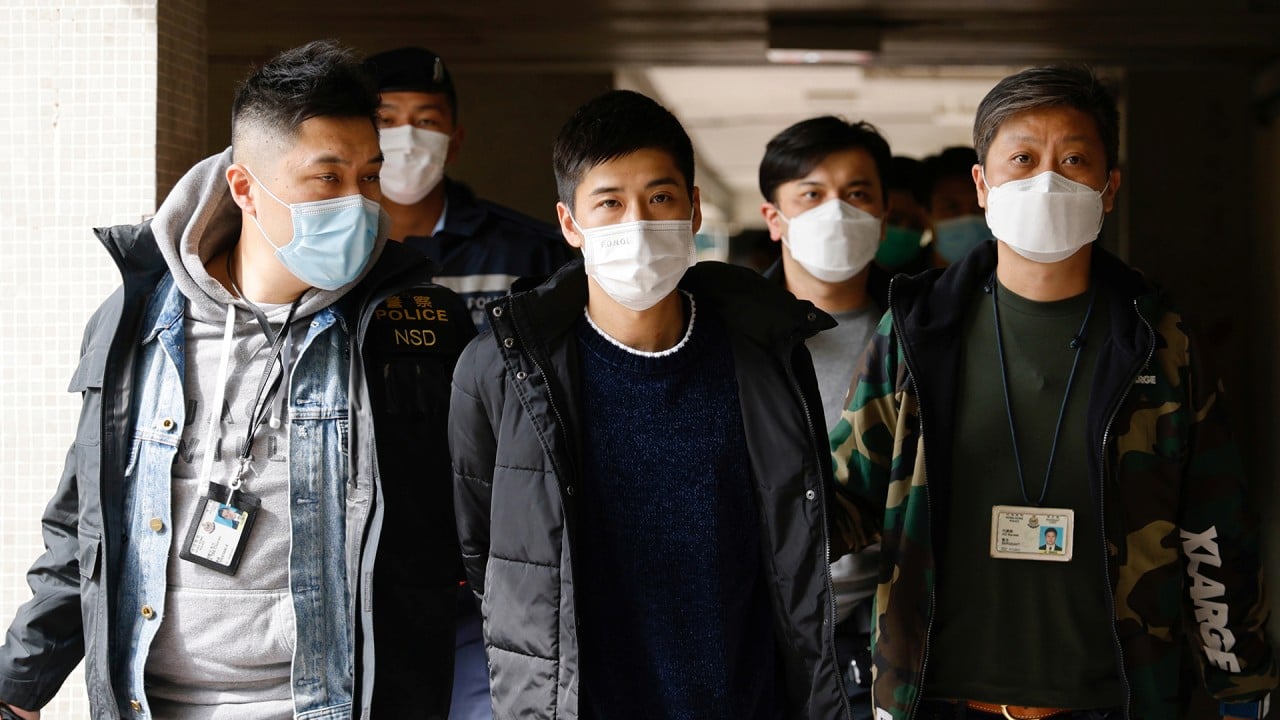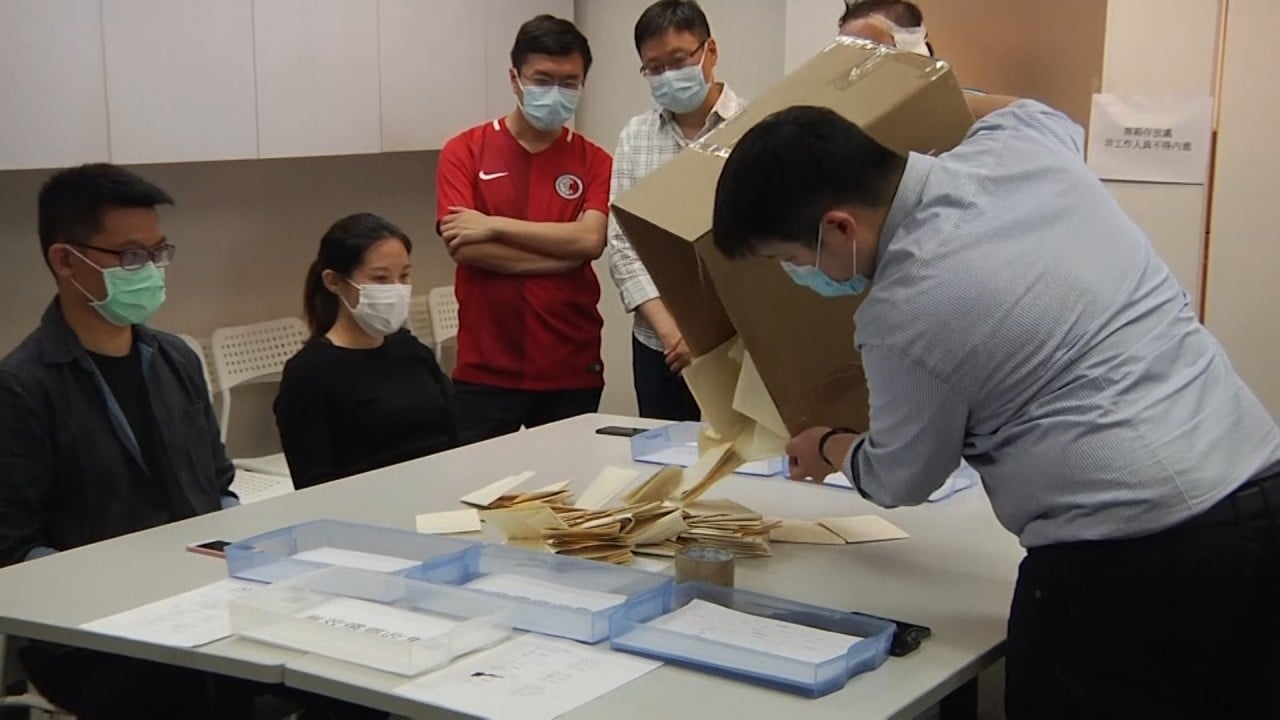
Explainer | Hong Kong national security law: a 35-plus ambition, ‘colour revolution’ and the ‘resistance’ – what led to biggest mass arrests under legislation?
- Some 50 suspects, including activists and former lawmakers, linked to primary election run-off by opposition camp last year
- Unofficial polls proceeded despite warnings from authorities, and young candidates with more confrontational approach proved popular among voters
The Post looks at the controversial opposition primary and why it triggered Beijing’s ire.

03:04
Mass arrests of Hong Kong opposition lawmakers, activists under national security law
What was the opposition’s primary about?
With anti-government sentiments running high in the wake of the 2019 protests, the opposition camp estimated it could win enough seats in the geographical and trade-based constituencies during the scheduled September 2020 Legco elections to yield a majority of 35-plus slots, a “massive constitutional weapon” to veto the budget and disrupt government, Tai said at the time.
Last April, Tai wrote an article The ten steps to real ‘laam chau’ – the fate of Hong Kong in Chinese-language newspaper Apple Daily, elaborating on the election strategy and proposing ways to paralyse the local government and ultimately trigger international sanctions against Beijing.
Primary turnout a strong political message to Hong Kong authorities: activist
To start laam chau, or mutual destruction – a term used by radical protesters – Tai predicted the first step would be the government’s disqualification of opposition candidates from running in the Legco elections, which would then provoke more residents to vote for the camp’s “Plan B” hopefuls, leading to a win.
Tai had estimated the government would then start disqualifying victors from the Legco polls by October 2020, but the time it took would allow the opposition to veto the budget, leading to the dissolution of the legislature as set out under the Basic Law. Under his projection, in October 2021, a new legislature, again led by the opposition, would block the budget once more, and prompt the chief executive to resign, effectively paralysing the city’s government and triggering Beijing to declare a state of emergency in Hong Kong.
“The ninth step in December of 2021 will see increasingly fierce resistance in the streets with an equally bloody crackdown, Hongkongers will start a mass strike, paralysing society,” he wrote. “When it comes to the tenth step, we will be already holding the Chinese Communist Party and jumping off the cliff together,” Tai said. But he could not predict the impact of international sanctions on China.

05:45
Hong Kong’s pro-Beijing camp reeling after crushing defeat in district council elections
Was there any tension within the camp?
The primary also fuelled internal competition – if not a rift – within the camp, particularly between the traditional pan-democrats and young activists, who opted for a more confrontational approach towards the government.
What were the results of the polls?
The run-off covered the five geographical constituencies of the city, Hong Kong Island, Kowloon West, Kowloon East, New Territories West and New Territories East, and the health services functional constituency seat, which had been held by the opposition bloc for years.
Ahead of the unofficial elections, the camp had planned to raise HK$3.5 million to fund the exercise, with the final bunch of candidates identified with the best chances going on to contest the Legco elections.

The primaries took place on July 13 last year, with more than 610,000 Hongkongers casting their ballots. The result indicated a dramatic reshaping of Hong Kong’s political spectrum, with activists on the front lines of the anti-government protests outperforming traditional pan-democrats.

02:07
More than 610,000 vote in Hong Kong’s pro-democracy opposition primary elections
Joshua Wong was the top candidate in Kowloon East, while two localists he endorsed – former journalist Gwyneth Ho and incumbent lawmaker Eddie Chu Hoi-dick – came first in New Territories East and New Territories West respectively.
Jimmy Sham Tsz-kit, convenor of the Civil Human Rights Front, organiser of some of the biggest protest marches in 2019, and young activist Sunny Cheung Kwan-yang took the first two places in Kowloon West.
Beijing’s fury, chilling effect and uncertainty loom after opposition polls
How did Beijing and the Hong Kong government react?
In a strongly worded statement, the State Council’s Hong Kong and Macau Affairs Office (HKMAO) lashed out at organisers of the unofficial polls, calling the primary “an unlawful manipulation of Hong Kong elections” and a “blatant challenge” to both the Basic Law, the city’s mini-constitution, as well as the new national security law, which was enacted last year on June 30.
The office singled out Benny Tai, a co-organiser of the polls and co-founder of the Occupy protest movement in 2014 which shut down parts of Hong Kong for 79 days, accusing him of being “a political agent of foreign forces”.
Beijing’s liaison office in the city also condemned the opposition camp for ignoring the Hong Kong government’s warning of possible legal breaches and pressing ahead with the primary. It accused Tai and the opposition of aiming to take over the city’s governance by staging the Hong Kong version of a “colour revolution”.
Following Wednesday’s arrests, the Office for Safeguarding National Security and the liaison office expressed firm support for the police operation and singled out Benny Tai in their statements.
“[We] resolutely support differentiating suspected lawbreakers who strategically organised or implemented plans to paralyse the government from the people who were misled to vote in the so-called primary elections,” a spokesman for the liaison office said. “[We] believe that the general public can clearly see the evil intentions of Benny Tai and others, and the harm caused to Hong Kong society.”
Defending the police operation, Hong Kong Secretary for Security John Lee Ka-chiu condemned opposition figures’ attempts as “evil” and said they were trying to “overthrow” the government or seriously interfere with the administration’s legal execution of duty.

Was the primary in breach of the national security law?
Pro-establishment lawmaker Priscilla Leung Mei-fun, a member of the Basic Law Committee, had said the government should investigate whether the polls breached Article 22 of the new law.
The article states that anyone who organises, plans, commits or participates in acts that seriously interfere in, disrupt, or undermine the performance of duties and functions of the government by force or threat of force, or other unlawful means could be deemed to be subverting the state power.
Tai rejected Beijing’s allegations as “nonsense, groundless and absurd” and said the primary was organised with only local resources. He also dismissed the accusation of subversion, saying legislators had the constitutional power under the Basic Law to veto the budget and hold the government accountable.
But Beijing’s condemnation did have a chilling effect. A day after the HKMAO statement, former lawmaker Au Nok-hin, who co-hosted the primary, declared he was quitting the organising task force. He said he had no choice, to protect his safety and that of others.
Democratic Party district councillor Andrew Chiu Ka-yin, convenor of the Power of Democracy which coordinated the primary, also withdrew from the task force, saying he had fulfilled his responsibilities.
The winners, including Joshua Wong, put up a defiant front, identifying themselves as a new “resistance bloc” within Hong Kong’s political spectrum. Sixteen allies, of which 15 were winners in the weekend primary, reaffirmed their stance against the new security law, saying they would “give full resistance against repression by the regime”.

